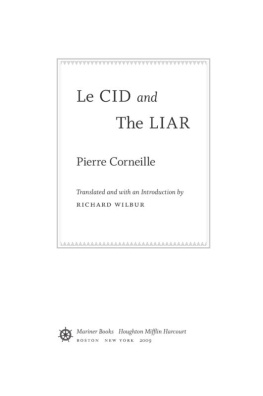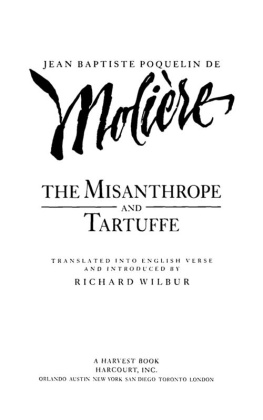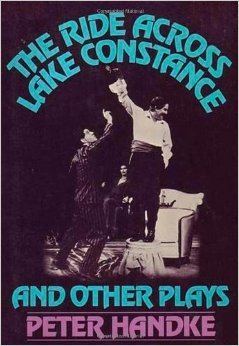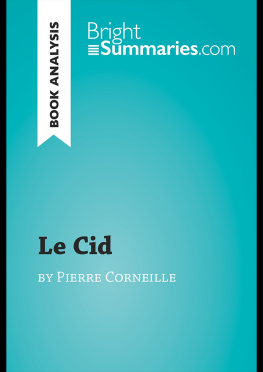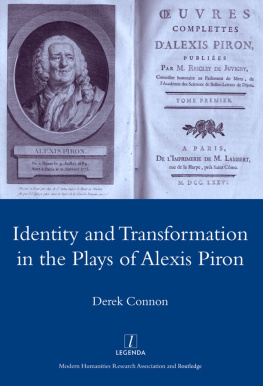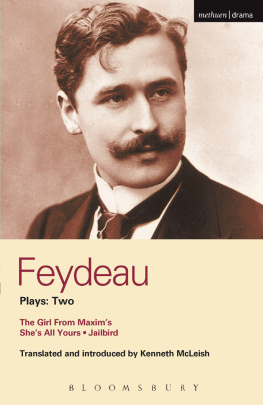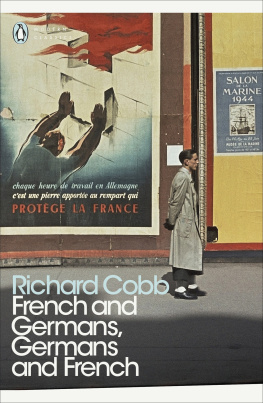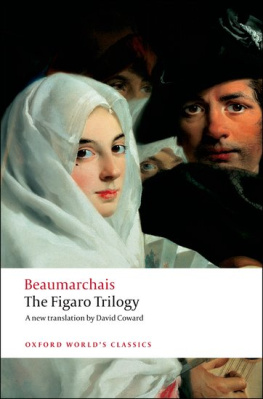Translated and with an Introduction by
RICHARD WILBUR
Mariner Books Houghton Mifflin Harcourt
BOSTON NEW YORK 2009
English translation copyright 2009 by Richard Wilbur
ALL RIGHTS RESERVED
For information about permission to reproduce selections from this
translation, write to Permissions, Houghton Mifflin Harcourt Publishing
Company, 6277 Sea Harbor Drive, Orlando, Florida 32887-6777.
www.hmhbooks.com
Library of Congress Cataloging-in-Publication Data
Corneille, Pierre, 16061684.
[Cid. English]
Le Cid ; and, The liar / Pierre Corneille ; translated and with an
introduction by Richard Wilbur.
p. cm.
ISBN 978-0-15-603583-5
1. Cid, ca. 10431099Drama. I. Wilbur, Richard, 1921 II. Corneille,
Pierre, 16061684. Menteur. English. III. Title. IV. Title: Liar.
PQ 1749. E 5 W 55 2009
842'.4dc22 2008049492
Book design by Melissa Lotfy
Printed in the United States of America
DOC 10 9 8 7 6 5 4 3 2 1
CAUTION: Professionals and amateurs are hereby warned that this translation, be
ing fully protected under the copyright laws of the United States of America, the
British Empire, including the Dominion of Canada, and all other countries that
are signatories of the Universal Copyright Convention and the International Copy
right Union, is subject to royalty. All rights, including professional, amateur, mo
tion picture, recitation, lecturing, public reading, radio broadcasting, and televi
sion, are strictly reserved. Particular emphasis is laid on the question of readings,
permission for which must be secured from the author's agent, in writing. Inqui
ries on professional rights (except for amateur rights) should be addressed to Mr.
Peter Franklin, William Morris Agency, 1350 Avenue of the Americas, New York,
New York 10019. The amateur acting rights of this translation are controlled ex
clusively by the Dramatists Play Service, Inc., 440 Park Avenue South, New York,
New York 10016. No amateur performance of the play may be given without ob
taining in advance the written permission of the Dramatists Play Service and pay
ing the requisite fee.
Passages from these translations of Le Cid and The Liar appeared in Parnassus, The
North Dakota Quarterly, The Yale Review, and The Hudson Review.
For David and Lisa
Le CID
1636
Introduction
P IERRE CORNEILLE, a thirty-year-old Rouen lawyer who had written a number of plays, chiefly comedies, was at once a major dramatist whenin late 1636 or early 1637Le Cid was performed at the Thtre du Marais in Paris. Though attacked by some on formal or moral grounds, it was greatly praised, and became the rage, and was promptly translated into English and other languages. We are told that beau comme le Cid came to be a popular catch phrase for expressing approval of anything. Corneille described his play as tragicomedy, a term that generally implied romance, adventure, variety, and a happy ending; but later he decided that Le Cid was a tragedy, and that has led to several centuries of scholarly discussion. What we can be sure of is that it is a heroic play.
The hero and heroine, Rodrigue and Chimne, live in an eleventh-century Seville that is portrayed as a warrior culture just beginning to be focused into monarchy. They are in love and, it initially appears, will soon marry. Their fathers, Don Digue and the count of Gormas, are powerful knights devoted to personal honor: when the count insults the much-older Don Digue, it becomes necessary for the latter's son Rodrigue, under the old feudal rules, to avenge him, and that means that he must kill the father of his beloved. Chimne in turn finds it her duty to seek, by one proceeding or another, and in spite of her love, the death of her father's slayer. What gives the young lovers heroic stature is that each, while doing what honor requires, continues to feel for the other a love composed of fervor and high esteem. Looking back on his play in an examen of 1660, Corneille describes his principals in just those terms: "Rodrigue performs his duty without giving up any of his passion; Chimne does the same in her turn..." In the play proper, Corneille is at pains to state and restate the dimensions of heroic character as he conceived them; prior to their duel, the count expresses in these terms his respect for his young adversary:
I know your passionate feelings, and admire
The way that duty regulates their fire:
Restraint does not unman your ardent soul,
But shows in you a noble self-control.
Thus abstractly defined, the gnrosit of Corneille's heroes, their greatness of spirit, can seem neat and unshakable. But under the atrocious pressures that obtain in Le Cid, its heroes must struggle throughout to be themselves, and that is where the drama lies. In the stanzaic soliloquy of Act One, Scene Six, Rodrigue makes a tormented decision to do his duty, and the infanta's self-conquering soliloquy in Act Five, Scene Two, is a variant of that. Chimne's struggles are the most moving, especially in scenes where she cannot repress her love, then blushes for that weakness and once more demands her lover's head. Both she and Rodrigue are drawn, in their anguishing circumstances, toward the release of death.
The fictional duration of Le Cid is but twenty-four hours, and yet one feels quite sure that ampler time will not bring a happy ending. Though in the final scene the king gives Chimne a year in which to dry her tears, after which she is to marry Rodrigue, it seems clear that she will never cease to see her beloved as her father's murderer. In the 1660 examen, once again, Corneille points out that Chimne makes no response to the king's decree; we are to understand her silence as an act of resistance and an expression of her hope that time will produce new obstacles to the marriage. "When kings speak," Corneille tells us, "the only respectful way to contradict them is to be silent."
The Cast of Characters describes Don Fernand as the "first king of Castile." He is not an absolute ruler, but a primus inter pares, and the disobedience of the count in Act One is but one sign of the transitional state of authority in the play. The throne has not yet become the sole shaper of law and justice, the sole center of power. There are voices, beside the king's, which look toward a securer polity, and we hear one of them when the infanta says to Chimne:
It's noble if, to avenge a father, we're
Compelled to seek the head of one so dear;
But it is nobler still if we forsake
Our private quarrels for the nation's sake.
Unfortunately, Chimne and her lover have been shaped and victimized by the old vendetta system, and though he will go on to military glory there is little hope for their love. As Rodrigue says in Act Three, Scene Four,
What pain our sires bequeath to you and me!
The diction of Le Cid is elevated because the characters are heroic and dwell in a romantic past; because the scene is often a royal court; because there is no comic relief; because Corneille wishes to enforce his moral vision by eloquent formulations; andfinallybecause the level of dialogue must be capable of modulating into the operatic: the stanzaic soliloquies of Rodrigue and the infanta are very much like arias, and the great scene between Rodrigue and Chimne (Act Three, Scene Four) concludes by evoking a duet.
The stylistic altitude of this play is such that Chimne can apostrophize her own eyes and go on to sum up her affliction in a powerful figure. I quote her two lines in my approximate translation:
Weep, weep, my blinded eyes, for half my heart
Is in the tomb, slain by its other part!
Next page
